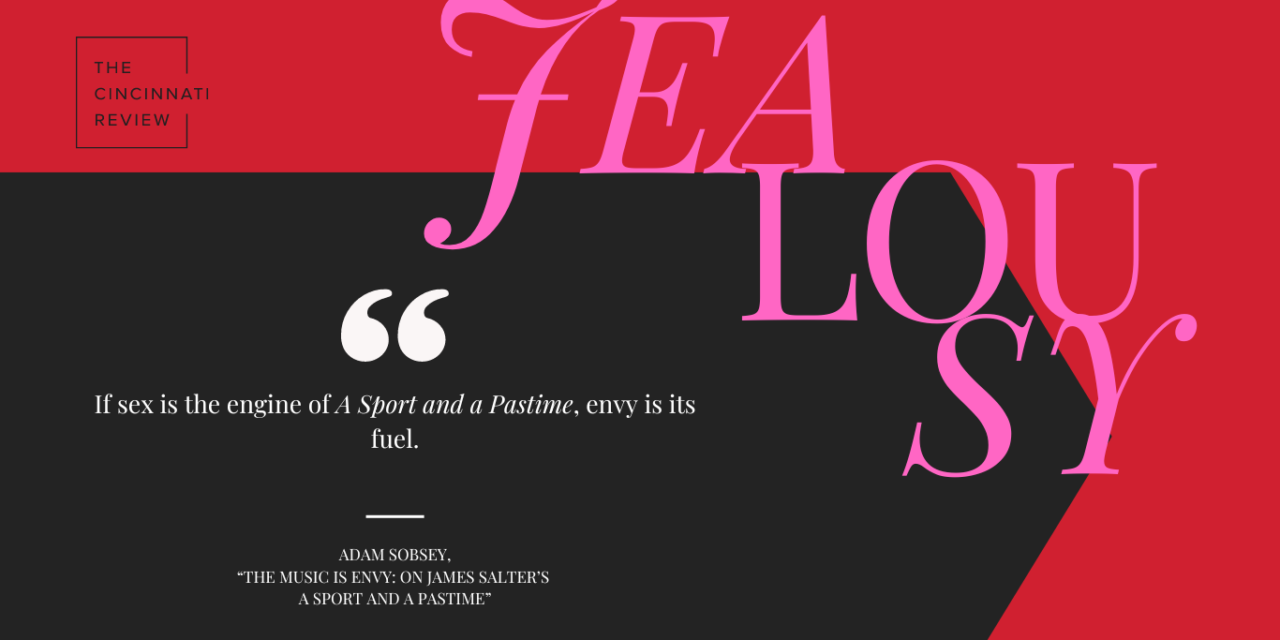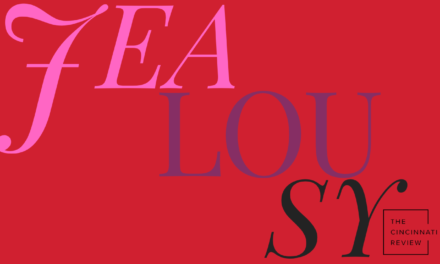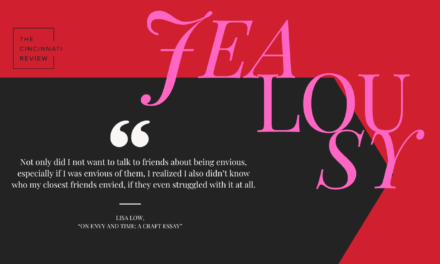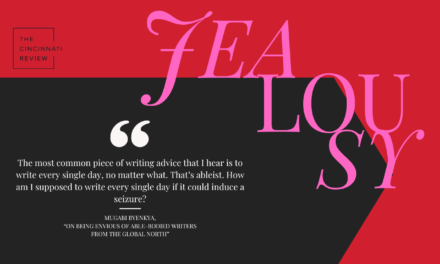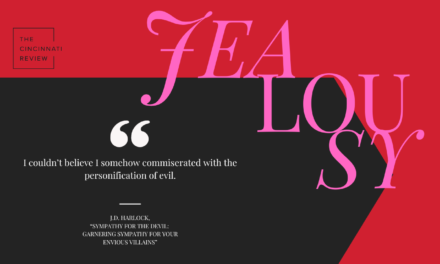To accompany our spring 2024 issue (21.1), we have curated a folio on jealousy and envy. Reading Ravi Mangla’s story “Flavors of Tuscany” in particular inspired us to put together this feature. We initially called it just a “jealousy” feature, which describes what happens in Mangla’s story, but we then expanded it to cover the concept of envy. Though most dictionaries have accepted that jealousy and envy are used nearly synonymously in our culture, the Chicago Manual of Style says, “Jealousy connotes feelings of resentment toward another, particularly in matters relating to an intimate relationship {sexual jealousy}. Envy refers to coveting another’s advantages, possessions, or abilities {his transparent envy of others’ successes}.” For the most part, we follow that formulation of the terms.
Here is Adam Sobsey’s contribution to that folio:
The Music is Envy: On James Salter’s A Sport and a Pastime
James Salter (1925–2015) once told a friend, according to a New Yorker article, that “one of the functions of a writer is to create envy in the reader—envy of the life that the writer is living.” It seems a perplexing aspiration. What is there to envy in the daily deskbound vexation of what T. S. Eliot called “the intolerable wrestle with words and meanings”? However, Salter, long known as a “writer’s writer,” did not live a conventional writer’s life. A dedicated voluptuary and bon vivant, sporting both in and out of the bedroom, he wrote habitually and sensuously of gastronomy, material luxuries, transatlantic travel, and sex. These pleasures form the locus of the envy Salter sought to create in his reader. But in only one of his six novels did he truly succeed.
A Sport and a Pastime (1967) is famous (or infamous) for its abundance of graphic sex, some of it culturally taboo. Recognizing that a first-person narrative approach risked smuttiness and the omniscient third person sounded clinical, Salter hit on the ingenious device of a narrator character who knows the young lovers at the center of the novel—it is he who unwittingly brings them together—and half retells, half invents their story: “Some things [. . .] I saw, some discovered, and some dreamed,” he says, deliberately confusing how he seems to know much more than he should. It is this very knowledge, though, that “poisons” him, he confesses. He’s wracked with a soul-rending envy that forms the central drama of the book. If sex is the engine of A Sport and a Pastime, envy is its fuel. Or, to put it in Salter’s terms—he once said, “The major axis of life is a sexual one; the music changes but the dance is always the same”—the music is envy, and it overwhelms the man singing it.
Envy was already in Salter’s consciousness when he began to write the novel in 1965, the year he turned forty. That same year, the astronaut Ed White became the first American to walk in space. Salter watched the historic event from a hotel room in Paris. Rather than rejoicing in White’s achievement, though, Salter recalls in his memoir, Burning the Days (1997):
My chest ached. My hair had patches of gray. White was turning slowly, upside down, tethered to the spacecraft by a lazy cord. I was sick with envy—he was destroying hope. Whatever I might do, it would not be as overwhelming as this. I felt a kind of loneliness and terror [ . . . ] I felt suicidal, ready to burst into tears. He did this to me unknowingly, as a beautiful woman crossing the street crushes hearts beneath her heel.
That image contains nearly the entirety of A Sport and a Pastime: an aging American man in France suffering from a voyeuristic, heartsick, self-abnegating envy of a younger American man’s heroic daring and defiance of nature—and preoccupied with the image of a beautiful, unattainable woman.
Salter’s etiolated narrator is a near-total cipher. We don’t even learn his name. He is like a ghost who haunts the narrative he tells. “I only want whoever reads this to be as resigned as I am,” he writes. He calls himself “clever and lazy,” “a double agent, first on one side—that of truth—and then on the other,” the epitome of the unreliable narrator. Probably around the age Salter was when he wrote the book, he is evidently an American photographer who has acted on the “visionary” idea of taking an extended sojourn in Autun, a town in Burgundy whose provincial authenticity harbors “the secret life of France, into which one cannot penetrate.” He stays in a summer house there, seldom used by its owners, also Americans, an expatriate couple in Paris: he a handsome and vigorous former hockey star with “a heroic scar” on his lip, she the charming and coy daughter of an ambassador who exudes an “intimation of sexual wealth.” The narrator envies their marriage and their brilliant, moneyed, vivacious life.
While he is in Paris arranging the details of his stay in their place in Autun, the three go to a party where “one meets a certain kind of people [. . .], people with money and taste.” There the narrator is introduced to Phillip Dean, a twenty-four-year-old Yale dropout (“What class were you?” “Several.”) who has been touring Europe with his elegant father, an esteemed drama critic. The older woman who makes the introductions is so smitten by Phillip’s looks, which seem to captivate almost everyone who meets him, that she forgets his name (the narrator will come to refer to him only as Dean, annealing his idol into one hard syllable, like a war hero). She giggles and prates nervously at her faux pas, but Dean says nothing to rescue her. For the narrator, it is jealousy at first sight: “I envy that silence which somehow doesn’t disgrace him, which is curiously beautiful, like a loyalty we do not share.”
The narrator tells Dean about his plans to go to Autun, drawn there by “a certain quality [. . .] old and well-formed.” Dean is intrigued: “’It sounds like the real France.” He soon turns up unannounced, driving a magnificent car that he has somehow talked its owner into lending him, and he will persuade three different people to give him money so he can prolong his time in Autun from an expected couple of weeks to nearly a year. He is kept there by an affair with a French girl named Anne-Marie, barely eighteen, whom he and the narrator first see on a nightclub dance floor not long after Dean’s arrival. The romance intensifies and advances in leaps of sexual venture, especially anal sex, whose almost smuggled introduction into the narrative at around its midpoint develops both their relationship and the plot.
“There’s enough passion in the world already. Everything trembles with it,” the narrator sighs near the beginning of A Sport and a Pastime, but he is soon drawn into the passion between Dean and Anne-Marie. He recounts—that is, imagines, but with voyeuristic closeness and in graphic, granular detail—their sexual exertions. At times, he yokes the movement of their physical bodies to the heavenly: “As his prick goes into her [. . .] he knows the path of the stars”; a few pages later, “galaxies [. . .] are floating down” over their coitus. In these moments, Salter connects Phillip Dean’s triumph in love to Ed White’s spacewalk.
The narrator pursues the couple almost everywhere they go, even separately. He fetishizes the meager objects in Anne-Marie’s one-room apartment in Autun, which is so small that she shares a hallway toilet with other tenants. He watches her walk to work in the morning as her footsteps “ech[o] on the pavement like shot,” piercing him like the heart-crushing high heels of the imagined Parisienne to whom Salter compared Ed White. In Paris, he observes Dean cadging money—that cardinal source of envy, which rears up again and again in the narrative—from his father and later from his sister. He is with Dean and Anne-Marie in the restaurants where they indulge in “the immortal procession of a French meal,” in hotel after hotel where they make copious love, and on their country drives in Dean’s almost mythologically swift, magnificent borrowed convertible around “green, bourgeoise France.”
The narrator longs to speak French, be French. “I would like to pass unseen,” he confides, but when he goes into shops, “They wait for me to speak, and of course it all vanishes then. They know I’m a foreigner,” just as he is a foreigner to the life Dean and Anne-Marie are living. Although he professes a deep habitude and devout happiness in Autun, he is gradually overcome by an unbearable loneliness, and then by a strange, paralyzing terror that seems to coat everything he perceives. He comes to see Dean’s dalliance with Anne-Marie as a frightening crime, and this terror finally infects Dean himself toward the end of the novel.
There is a reason for that transference: Salter is Dean too, of course. A Sport and a Pastime is a heavily autobiographical novel. An Air Force pilot and later National Guard member, Salter was stationed in 1961 at a military base not far from Autun, where he had the affair that led to the book. (When it was published, it ended his marriage.) The narrator’s valorizing of Dean is clearly an expression of his amazement at the passion, puissance, and nerve of his younger self: “I am only the servant of life. He is an inhabitant.” The book thus enacts a triple diffraction: author, narrator, and hero are aspects of the same man in different stages, conditions, and moods, and Salter cannily inhabits all three in turn depending on his purpose to relive or reflect, conceal or reveal. Despite the narrator’s worship of Dean—“I am afraid of him, of all men who are successful in love”—at regular intervals Salter allows us to see quite plainly how callow, manipulative, pretentious, feckless, and selfish Dean really is, and how the narrator’s obsessive envy and Dean’s consuming lust are manifestations of the same substance. When near the novel’s end the narrator helplessly submits to Dean’s request for money to buy his airfare back to America, “something I will be ashamed of later”—the cowardly Dean has not told Anne-Marie of his plans to leave her—he recognizes that, as his accomplice in this love crime, “I am only exchanging his disgust for my own.”
After Dean has flown back to the US, Salter kills him off, absorbing his figment back into himself. (One wonders if Chuck Palahniuk had A Sport and a Pastime in mind when he wrote Fight Club.) The narrator’s final words about Dean voice the same envy he felt on their first encounter at the party in Paris: “One must have heroes, which is to say, one must create them. And they become real through our envy, our devotion.” He concludes with a final glance at Anne-Marie, now a married mother, “deep in the life we all agree is so greatly to be desired”—a final, ironic invocation and denunciation of socially mediated envy.
***
In 2017, I went to Autun. I suppose Salter’s dubious project to create envy in his reader had worked on me after all. Yet I was not sure I was going to the right place. “I’ve said Autun,” the narrator of A Sport and a Pastime tells us, “but it could easily have been Auxerre.” Yet when I began walking around “this blue, indolent town,” as Salter calls Autun, it was unmistakably clear that Auxerre was a misdirection, a way of throwing the reader off his scent. I could easily follow the nomenclature of his “geography of favored streets” that leads up the hill from the Champ de Mars to the Roman wall and finally to Autun’s cathedral, “like a great, beached ship.” I found what must have been the house where Salter’s narrator stays, and one of the restaurants where multiple scenes take place. Down in “one of those quiet backwaters” was the diminutive Place du Carrouge, the location of Anne-Marie’s single-room-occupancy apartment house.
I stayed that night in a chambre d’hôte in a converted fifteenth-century canons’ residence. The proprietress, asking after my purpose in little-visited Autun, revealed that she was familiar with A Sport and a Pastime and added that Salter himself had come to her place just a few years earlier. He was by then an old man, at least eighty, and when he made a peculiar, and peculiarly adamant, request for a ladder—he evidently wanted to see the top of a stone wall in the courtyard, or perhaps to look out over it—she worried he might be too frail to climb up and down. Nonetheless, she supplied him with the ladder. He took a few pictures at the top of the wall, descended, and abruptly left without taking a room.
Hearing this left me with twin envies. There was mine, of course, over the mystery of Salter’s purpose. Had he been looking for something to do with A Sport and a Pastime—one of those insoluble fragments that preoccupy his narrator—or perhaps making a photodocumentary, like his narrator-photographer “making an extraordinary record of this town” with his camera? More powerfully, though, it seemed to me that Salter was driven back to Autun by the envy that cuts perhaps deeper than any other: not the envy we feel for the lives or the possessions of others, but for the best times of our own lives. “One alters the past to form the future,” Salter writes. The attempt to recall, revisit, and reconstrue that past is the business of so many novels—and A Sport and a Pastime is by far his best, “curiously beautiful” like Phillip Dean’s enviable silence, and in the words of its most famous admirer, Reynolds Price, “as nearly perfect as any American fiction I know.”
If it is nearly perfect, that is because it is so nearly a thoroughgoing failure. A Sport and a Pastime courts disaster on almost every page, teetering and in a few instances arguably toppling over into countless mires: pornography, misogyny, racism, sentimentality, superficiality, excess, nostalgia, preciousness, vanity, snobbishness. Yet out of the cardinal sin of envy, and abetted by lust, gluttony, greed, and sloth, Salter reawakened and repurified the passion with which everything already trembles. He pulled off an impossible spacewalk.
He must have known it. Salter’s subsequent fiction often summons food, travel, sex, and material luxuries in an obvious effort to recreate the magic of A Sport and a Pastime, but with diminishing returns and frequency. It was as though he, like Dean, had grown “weary of his gifts.” In the half century that remained to him, Salter published just three more novels, an occasional short story, and scattered essays. His early-career success as a Hollywood screenwriter petered out, and his scripts went mostly unproduced. Meanwhile, he hobnobbed immoderately on both sides of the Atlantic with the literati and glitterati and “people with money and taste” of the sort who populate the fateful party where the narrator of A Sport and a Pastime first meets Phillip Dean. Driven by lust and wanderlust, he chased women and traveled often. As that 2013 New Yorker piece points out, he was known to “complain to a friend about his lagging productivity and then go off to France for three weeks to hang around.” The protagonist of his sixth and final novel, All That Is (2013), which he did not complete until shortly before he died, also has the first name of Phillip and resembles the man Dean might very likely have become, concupiscent and vague. Entire scenes and even individual lines are repetitive and hollow echoes of A Sport and a Pastime. Right up to the end, Salter seemed envious of his own masterpiece.
Adam Sobsey‘s new book, A Jewish Appendix, is forthcoming from Spuyten Duyvil Press this year. He is the author of Chrissie Hynde: A Musical Biography (University of Texas Press, 2017). He has written for the Paris Review, the Los Angeles Review of Books, and many other publications. He is also a playwright, with work produced in New York, California, Texas, and North Carolina.

